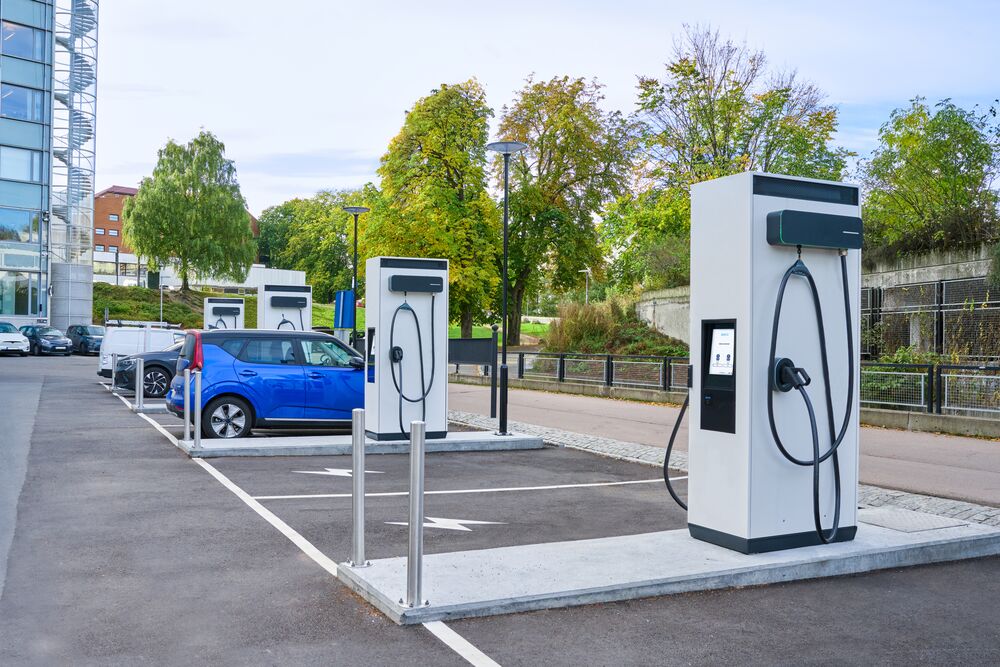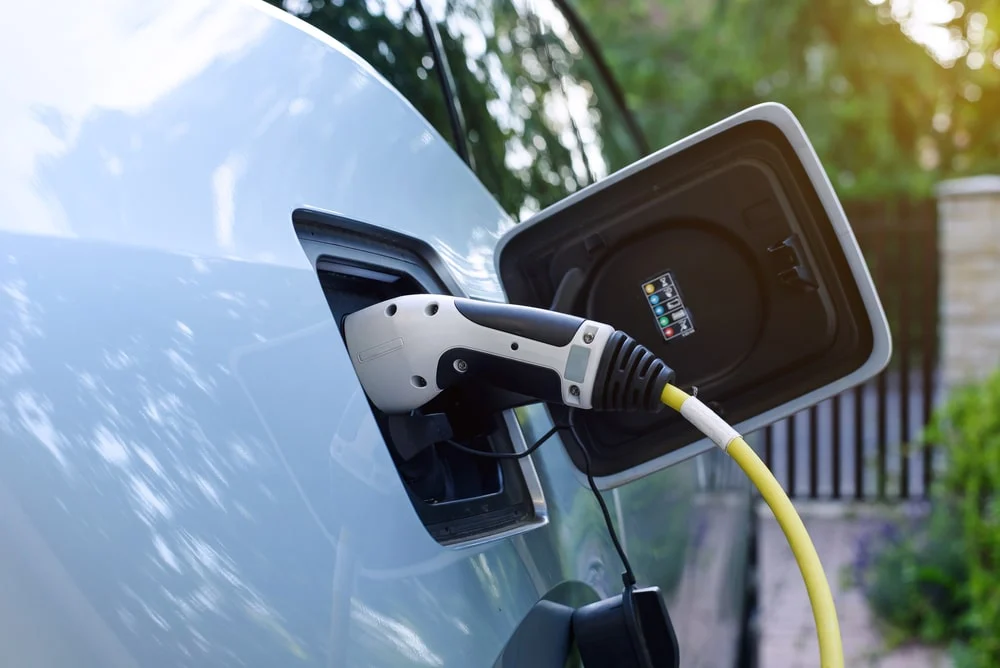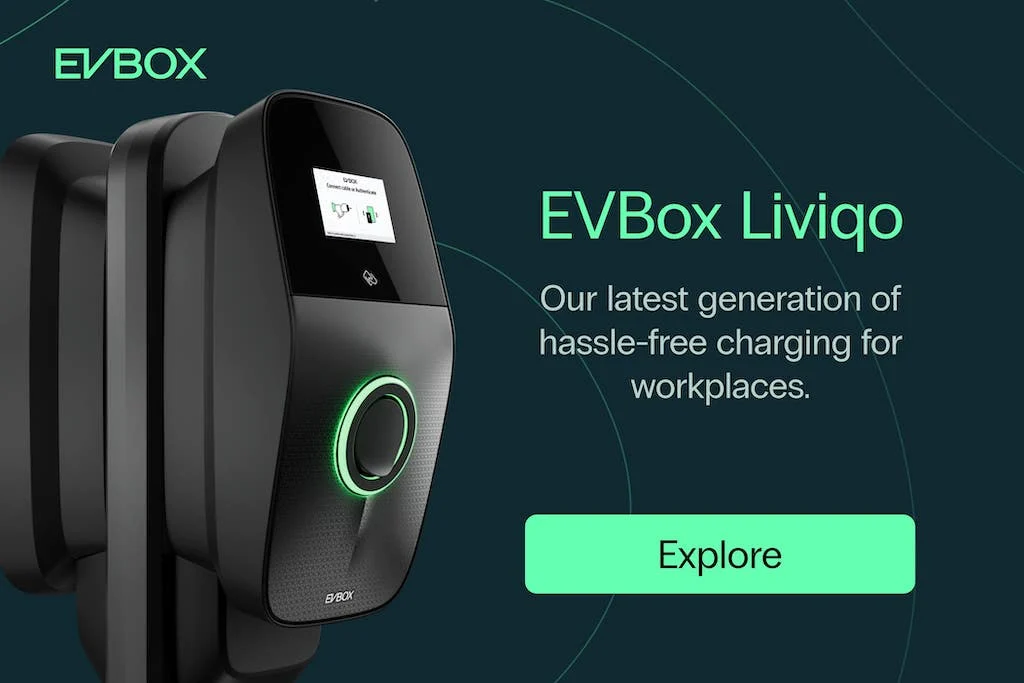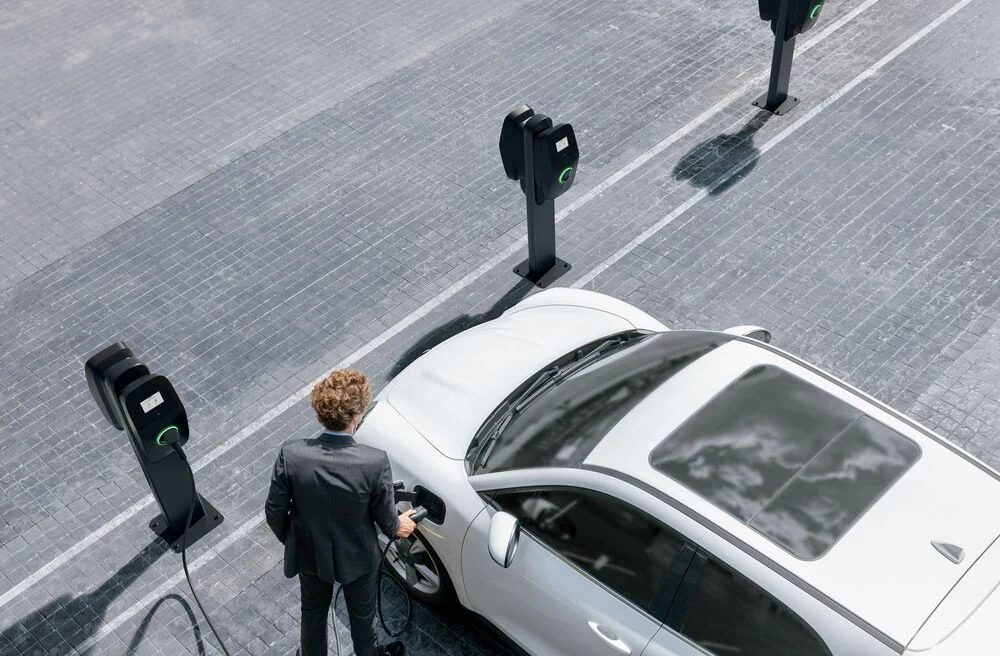Last updated on February 24, 2023
The rise of electric vehicles (EVs) has created a growing demand for EV charging infrastructure. Whether office culture evolves or not, workplace charging is expected to play a major role in the future. Employees are increasingly seeking sustainable and environmentally-conscious employers, and offering EV charging at your office can boost morale, generate extra revenue, and support your green initiatives.
In this article, we explore how modern offices are becoming more sustainable, why companies are investing in EV charging as an employee benefit, and how it helps businesses align with their environmental goals.
The challenges of the modern office continue to evolve
Today’s employees have more freedom than ever before—whether it's about where they work, how they work, or what they expect from their employer. Businesses must now compete not only for customers but also for top talent by offering benefits that go beyond traditional perks like healthcare and competitive salaries.
Since the pandemic, retaining employees and encouraging them to return to the office has become a major challenge. Many companies are still navigating this new reality. Even as the world moves past the worst of the crisis, the shift toward remote work has reshaped expectations.

Employees are increasingly looking for employers who take meaningful action on climate change. According to Gallup, 71% of employees consider a company's environmental impact when deciding whether to join. And those who feel their employer is making a positive difference are more likely to stay.
At the same time, electric mobility is gaining momentum. As more people switch to EVs, the need for reliable charging infrastructure is growing. However, public charging stations are struggling to keep up with the rising demand. This is where workplaces come into play.
The number of EV charging points in Europe is expected to jump from around 3 million today to nearly 30 million by 2030. Workplace charging will grow from 10% to 15% of all charging during that period.

Workplace charging is especially important for those without home charging options. Employees can charge slowly over the course of the day, making it a convenient and cost-effective solution.
In this article, we’ll dive deeper into the evolution of the modern sustainable office, explore why more businesses are investing in EV charging as an employee benefit, and look at how these efforts help companies walk the talk when it comes to sustainability.
More sustainable office buildings
Sustainability is no longer a nice-to-have—it's a must-have. Employees across the globe are demanding that their employers take real action on climate change. With environmental issues affecting every corner of the world, people want their jobs to contribute to a better future.
According to research, 70% of millennials would prefer to work for a company with a strong sustainability agenda, and 75% would even accept a lower salary for that opportunity.

To meet these changing expectations, companies are embracing sustainability as a core value. This goes beyond just switching to electric vehicles. It includes everything from energy-efficient buildings to eco-friendly office spaces.
Certifications like BREEAM and LEED are becoming more common, showing that a company is committed to sustainability. These standards help create offices that are not only good for the environment but also great for employees.
 Take Deloitte’s Amsterdam office, The Edge, as an example. This energy-positive building produces more electricity than it uses, collects rainwater for toilets and gardens, and integrates smart technologies to create flexible and efficient workspaces. It holds the highest BREEAM score ever awarded to an office building.
Take Deloitte’s Amsterdam office, The Edge, as an example. This energy-positive building produces more electricity than it uses, collects rainwater for toilets and gardens, and integrates smart technologies to create flexible and efficient workspaces. It holds the highest BREEAM score ever awarded to an office building.
But sustainability isn’t just about design and construction. Modern offices are also focusing on creating healthy and eco-friendly environments. For instance, many companies are improving natural lighting, increasing ventilation, and adding indoor greenery to enhance well-being.
These efforts not only benefit the planet but also make employees happier, healthier, and more productive. And as the world continues to recover from the pandemic, the need for such initiatives is only growing.
Electric mobility and EV charging can be a powerful addition to these efforts, helping companies reach their sustainability goals while boosting employee satisfaction.
Bring your employees back to the office
Working from the office used to be the norm, but now it's more of a privilege. Employees are choosing to return only if the office meets their needs and offers real value.
A 2023 report by the European Central Bank found that a third of employees in Europe still prefer more remote work. The main issue? Commuting. Workers who spend over an hour commuting each way often prefer working from home 10 days a month—four days more than those with shorter commutes.

While some argue for the benefits of commuting, it’s clear that it brings stress. The bottom line is: your office needs to make the commute worth it. While EVs aren't the sole solution to remote work, they can definitely help.
You can't control all the stresses of commuting, but you can reduce some of them. By offering EV charging at your workplace, you give employees the option to charge their cars while they're at work. If they don't own an EV yet, this could even encourage them to make the switch.
Offering free or discounted charging can make this even more appealing. Even though traffic and long commutes might still be an issue, having a clean, quiet place to charge your car is a big step forward compared to crowded public transport or waiting in the rain for a bus.
More employees will start driving electric vehicles

Even if you haven’t made the switch yourself, your employees are. In recent years, both Europe and the U.S. have seen a significant increase in the number of electric cars on the road.
According to EY, by 2050, electric vehicles are expected to make up 65% of the U.S. vehicle market, up from just 2% in 2020. In Europe, similar predictions are being made, with global projections suggesting that 80% of the market will be electric by 2050.
This growth is driven by falling battery prices, increased range, lower fuel and maintenance costs, and government incentives. As a result, more people are considering or already driving electric vehicles.
As the EV market continues to grow, the likelihood that your employees are either thinking about or already using one increases significantly.
Most EV drivers are full-time workers with higher education levels and above-average incomes. One in three is under 35—making them highly sought-after talent in the job market.
And this demographic is exactly the kind of talent your business is trying to attract. So, it makes sense to offer EV charging as a benefit to appeal to this group.
EV chargers can attract and retain top talent

In today’s competitive job market, sustainability is a major selling point. Employees are looking for companies that share their values, and offering EV charging is a powerful way to show your commitment to the environment.
Many employees don’t have access to home charging, so they rely on workplace stations. By providing this benefit, you’re not only supporting their transition to electric mobility but also showing that your company cares about their lifestyle and convenience.
Charging at work is simple: plug in when you arrive, and leave with a fully charged car. No more worrying about low battery or searching for public stations. This convenience can make a big difference in how employees view your company.
Offering EV charging is becoming a key part of your Employee Value Proposition (EVP). It boosts morale, attracts talent, and shows that your company is forward-thinking and environmentally responsible.

Businesses are electrifying their fleet
Business fleets are playing a crucial role in the transition to electric mobility. They’re not only reducing emissions but also influencing consumer behavior. In Europe, almost two-thirds of all new cars are purchased by private companies, giving them significant influence over the EV market.
According to EY, fleet electrification should lead the way in decarbonizing transportation. This creates huge opportunities for businesses to get ahead in the electric mobility ecosystem.

Many large companies are already making the switch. Amazon, Walmart, General Motors, and FedEx are just a few examples of organizations that have committed to electrifying their fleets. As more employees experience electric vehicles through their jobs, this trend will shape their expectations and preferences.
By adopting EVs early, businesses are also helping drive down costs through economies of scale. This makes electric vehicles more accessible to everyone.
One of the most important parts of this transition is charging infrastructure. According to McKinsey, Europe needs 3.4 million charging stations by 2030 to support its fully electrified fleet. That means the number of charging points will grow from 3 million today to nearly 30 million by 2030, according to ChargeUp Europe.
In the U.S., President Biden has announced a $7.5 billion investment in EV charging infrastructure. This shows the growing importance of making EVs a viable option for more people.
As this shift continues, charging stations will become a key factor in how employees interact with electric mobility. By making them as accessible as possible, you’re preparing your business for the future and contributing to a cleaner, more sustainable world.
EV chargers help increase the office’s reputation

Whether you're an office owner, a real estate agent, or a tenant, offering EV charging can boost your office’s reputation. Charging stations are visible and noticeable, making them a great way to showcase your commitment to sustainability.
Many people care about reducing CO2 emissions, and 88% of customers want organizations to help improve their environmental impact. This means that your office’s sustainability efforts are becoming more important than ever.
Providing EV charging facilities is a clear and visible way to show your company is taking action. Unlike certifications like LEED or BREEAM, which may not be immediately obvious, EV chargers are right there in your parking lot, making your commitment to sustainability easy to see.
EV chargers can increase revenue for your facility
For forward-thinking businesses and facility managers, introducing EV chargers is more than just a sustainability move—it can also be a source of revenue.

Many real estate companies are using EV charging as a new revenue stream. By installing public charging stations, they can attract new customers, increase their existing income, and even cross-sell other services.
With innovative charging technology, businesses can control access, set pricing, and even offer management platforms tailored to different users.
For example, you could offer a flat rate for all users or create a tiered system where office workers pay less than external visitors. You could also use the presence of EV charging to increase brand visibility on maps like Google Maps or Waze, attracting more customers to your location.
“Clear leadership and collaboration seem key to ensuring all is done to effectively tackle the net zero carbon challenge,†says the Future Workplaces Report 2022. “The climate emergency is a global issue, and we all have a duty to act.â€
Read more about workplace EV charging
The benefits of equipping your workplace with EV charging stations and offering electric company cars are numerous. But did you know that EV charging can also be a way to attract customers and generate revenue?
Take a look at our free guide to discover how workplace EV charging goes beyond just improving employee satisfaction. It can also be a smart business decision that supports your long-term goals and strengthens your brand.
Dri Reformer Tube,Casting Reformer Pipe Tube,Primary Reformer Tube,Catalyst Reformer Tubes
Jiangsu Taigoo New Material Co. Ltd. , https://www.spun-castings.com